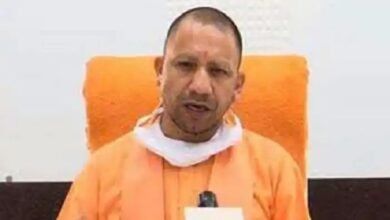[ad_1]
THE RSS may be riding high on the fruition of its Ram Temple movement, but the abrogation of Article 370, which granted special status to Jammu and Kashmir, has been its oldest ideological project. The maximum number of resolutions by the Sangh have been on Kashmir.
Since the 1950s, the RSS has passed a total of 27 resolutions on Kashmir. These have largely stated that Article 370 is a provision “to break Kashmir from Bharat”. They also allege that the Article engenders disintegration, encourages corruption and, as such, should be abrogated. This fact has been very clearly stated in many resolutions.
In 1964, a resolution by the Akhil Bharatiya Pratinidhi Sabha (ABPS) — the highest decision-making body in the RSS — not only asked for the abrogation of Article 370, but also to turn the state into a Union Territory. In its 2002 resolution too, the Sangh supported the demand for the reorganisation of Kashmir.
Its first resolution on Kashmir came in 1953, with the title “Movement for Complete Integration of Kashmir with Bharat”. It was a response to alleged repression of an agitation by the Praja Parishad, a political party closely connected with the RSS, for “effecting the complete merger of the Jammu and Kashmir area into Bharat”.
The Praja Parishad was founded in November 1947 by RSS leader Balraj Madhok. It opposed the special status granted to the state under Article 370 of the Indian Constitution.
It was this movement that even Jana Sangh founder Syama Prasad Mookerjee associated himself with, holding a series of public meetings across North India in 1952 and 1953, demanding the complete integration of Kashmir with India. Mookerjee at that time gave the clarion call: “Ek desh mein do vidhan, do nishan nahin chalenge, nahin chalenge (Two Constitutions and two flags in one country are not acceptable)”.
Mookerjee travelled to Kashmir in 1953 to agitate over the demand, and was arrested. He died in detention.
In 1964, the ABPS passed a resolution on Kashmir’s special status. “Article 370, which was incorporated into our Constitution as a temporary provision on Kashmir, must be immediately repealed and the state brought in line with other states. The idea of erosion or gradual scrapping of the Article or further modification of the Article is meaningless, impractical and fraught with dangerous consequences. It would only encourage separatist tendencies,” it said.
It also said that in view of the national emergency and growing acts of aggression by Pakistan, “It is imperative that the Centre directly takes over the administration of the Kashmir state.” It said, “a strong, upright and efficient administration has become the prime need of Kashmir”.
In 1982, the RSS’s top executive body, the Akhil Bharatiya Karyakari Mandal (ABKM), passed a resolution on the J&K government’s Resettlement Bill that sought to give Indian citizenship to Kashmiris who had migrated to Pakistan at the time of Partition.
“The ABKM is of the emphatic opinion that Article 370 of the Constitution, under cover of which the J&K Assembly is manoeuvring to achieve its separatist and communal ends, should be scrapped, without any more delay. Perpetuation of such an obnoxious section will only place the integrity, security and freedom of the country constantly under a hanging threat and embolden separatist forces in other parts of the country as well,” it said.
In 1984, in the context of Sikh militancy, the ABKM again demanded abrogation of Article 370, arguing that weapons in Punjab were coming through Kashmir. In 1986, the ABPS passed a resolution demanding the Article’s removal, as it was “inspiring extremism in Punjab and Mizoram”. The next year, the ABPS said in a resolution that Article 370 was encouraging pro-Pakistan forces in Kashmir to indulge in anti-Hindu conspiracies.
In 1990, at the peak of militancy in the Valley, an ABPS resolution said that continuing to retain Article 370 was akin to putting “a question mark on the full integration of the State and to accord legal sanction to secessionist mentality”. A 1993 ABKM resolution said Article 370 was being used as a handle by “unscrupulous politicians to exploit the masses”.
Through the ’90s and early 2000s, when militancy raged in the region, the RSS regularly came out with resolutions on Kashmir that spoke about the need for its integration with India and the dangers of granting more autonomy to Kashmir, apart from seeking abrogation of Article 370.
“The Pratinidhi Sabha calls upon our people to clearly realise that reverting to the pre-1953 status would only result in reverting to the condition of ‘Do Vidhan, Do Nishan aur Do Pradhan’ ( Two Constitutions, two Flags and two Heads of State),” the 1997 ABPS resolution said.
It is an argument Union Home Minister Amit Shah has often made in Parliament while debating Article 370.
In 2002, when a BJP government was at the helm, the ABKM passed a resolution supporting the demand for UT status for Ladakh, saying the state government had a “blatantly discriminatory attitude” towards Jammu and Ladakh. In 2004, the ABPS passed a resolution against the J&K Permanent Resident (Disqualification) Bill, calling it discriminatory towards Kashmiri women marrying outside, and underlining that the problem lay in Article 370, which it said was contrary to the idea of “One Nation, One People”.
In 2010, when Kashmir was rocked with violent agitations, and government-appointed interlocutors talked about greater autonomy for Kashmir, the ABKM passed a resolution emphasising Kashmir’s integration with India as “full and final”, and autonomy being a “post-dated cheque for Partition”. The same year, the ABPS again passed a resolution against Article 370.
The next RSS resolution came in 2020, where the ABKM welcomed the decisions taken by the Centre on August 5, 2019, and praised the political will of Prime Minister Narendra Modi.
[ad_2]





